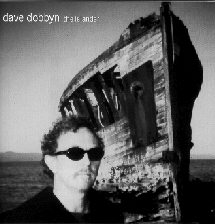
Dave Dobbyn
Columbia (1998)CD: 491456.2
 |
The
IslanderDave DobbynColumbia (1998)CD: 491456.2
|
Song List |
|
|---|---|
| 1. | Waiting |
| 2. | Mobile Home |
| 3. | Hanging in the Wire |
| 4. | Be Set Free |
| 5. | Beside You |
| 6. | Blindman's Bend |
| 7. | Standing Outside |
| 8. | What Have You Fallen For |
| 9. | I Never Left You |
| 10. | Keep a Light On |
| 11. | Hands |
| 12. | One Proud Minute |
| 13. | Hallelujah Song |
| Finding a way of telling his own stories was what Dobbyn found difficult
on The Islander. "There's never been a shortage of melody or music with
me. But since Twist I've been concentrating on becoming a better musician: inventing
chords, looking around, listening more than I ever have. What was agonising about this
record were the lyrics. I had a lot hanging around, but they didn't feel right. Now, I
feel a lot fresher about the whole approach of writing songs." As a solitary songwriter, says Dobbyn, it's important to have a good time- and provide one for your audience. But the way he recorded The Islander made it feel like the most collaborative album he's done yet. Sessions began in Neil Finn's basement studio last September, when Dobbyn laid down several rhythm tracks with visiting Australian musicians Peter Luscombe and Bill McDonald. Both are sought after players in Australia; Luscumbe drums in Paul Kelly's band, and McDonald has played with Frente and Neneh Cherry. It had been years since Dobbyn recorded with a band. "They were chuffed the way it came out: that the sound coming off the tape was the same as went on." Dobbyn credits the natural sound to Auckland engineer Sam Gibson (Finn's Try Whistling This) and the influence of american producer Tchad Blake (Crowded House, Cheryl Crow, Dobbyn's Twist). In the summer of '97 Dobbyn re-entered the studiio with Allan Gregg and Ross Burge, the Muttonbirds' rhythm section that had played on Twist. "From then on, it was plain sailing. I took care of most of the guitar work, though there's bits of Neil on it here and there. Sam and I did some programming of sounds, a bit of jiggery pokery- but we found there were some layers that just didn't need to be there." Dobbyn then followed Finn's approach with Try Whistling This. He went to New York. "Neil highly recommended that experience of getting out of town, soaking up another culture, seeing your music in relief." Although that worked for Dobbyn, it wasn't in the way he expected. "I connected with a few musicians, but looked at what it would cost to work there. Then I looked at the job I'd done getting the music on tape, as a producer by default. It became clear that it was fine, that I should hold my head up and think 'do we really need those overdubs?' "So I culled a few things out, and it came back to pretty much a rock and roll band. Everyone agreed it sounded better and better. Albums- you've got to live with them a while to really enjoy them." Coming home also provided the title. "I was back only a couple of days, and went up to the Auckland War Memorial with my son, Eli. A group of soldiers had just finished an ANZAC ceremony, were hugging each other and crying, with their families around. On the steps, there's this brilliant view across the harbour and Rangitoto. I got this incredible feeling of outpost, that I was way out on the edge of the world. And we have been all this time, while fighting other peoples wars. I was aware of how insular New Zealand can be, but expansive at the same time. The only reason people don't notice us is because we're a bunch of islands in a sea. Nobody gives a damn. That's the New York attitude. But there's something exotic about this place which we don't always see because we're in it. That exotic thing is a real mixture. I came to terms with the fact that I'm a Pacific Islander a long time ago. There's nothing vaguely European about me apart from the colour of my skin. So I've called it The Islander because it's a stamp of identity." [excerpt edited from the Sony Press Release] |
[home] / [who is dave?] / [where is dave?] / [e-mail list] / [fun] / [links]
This page hosted by ![]() Get your Free Homepage
Get your Free Homepage